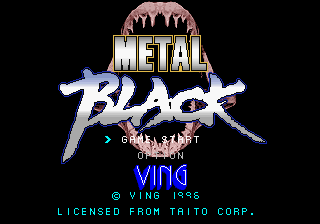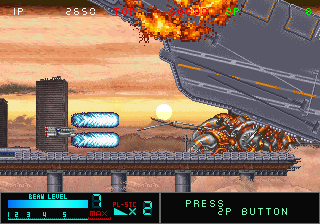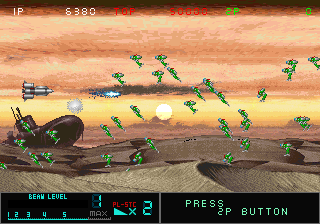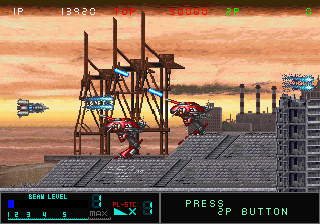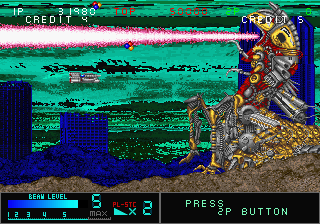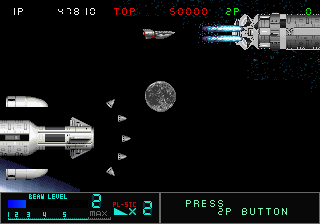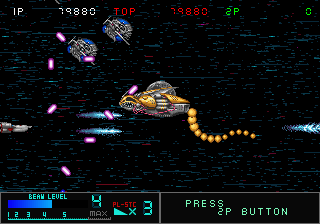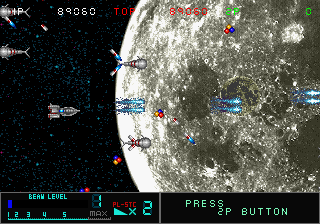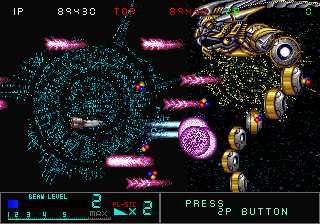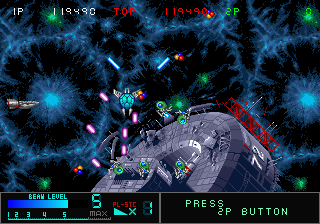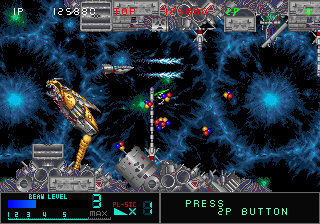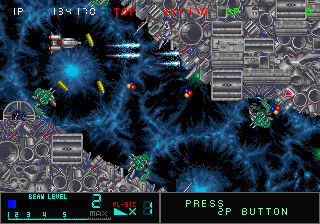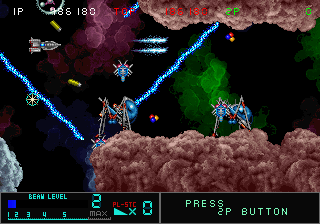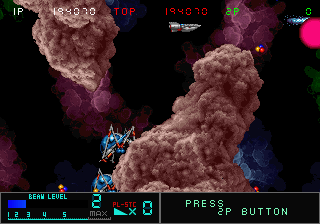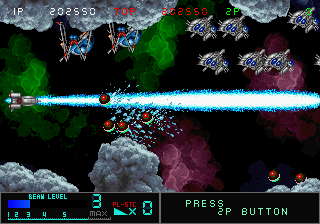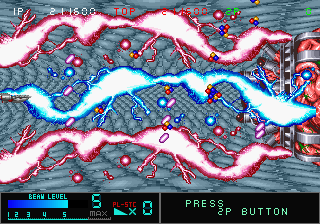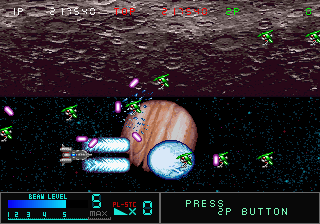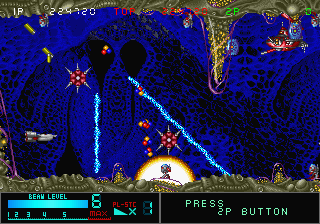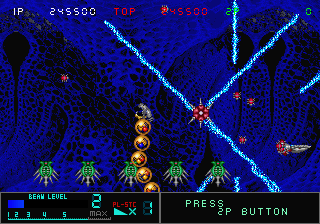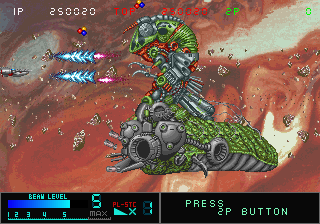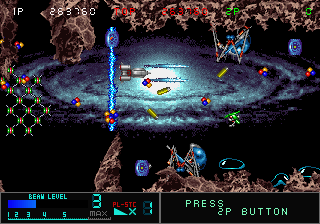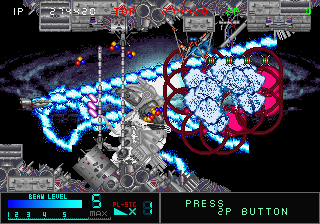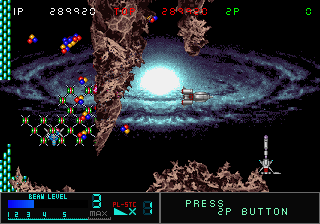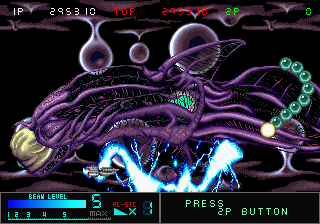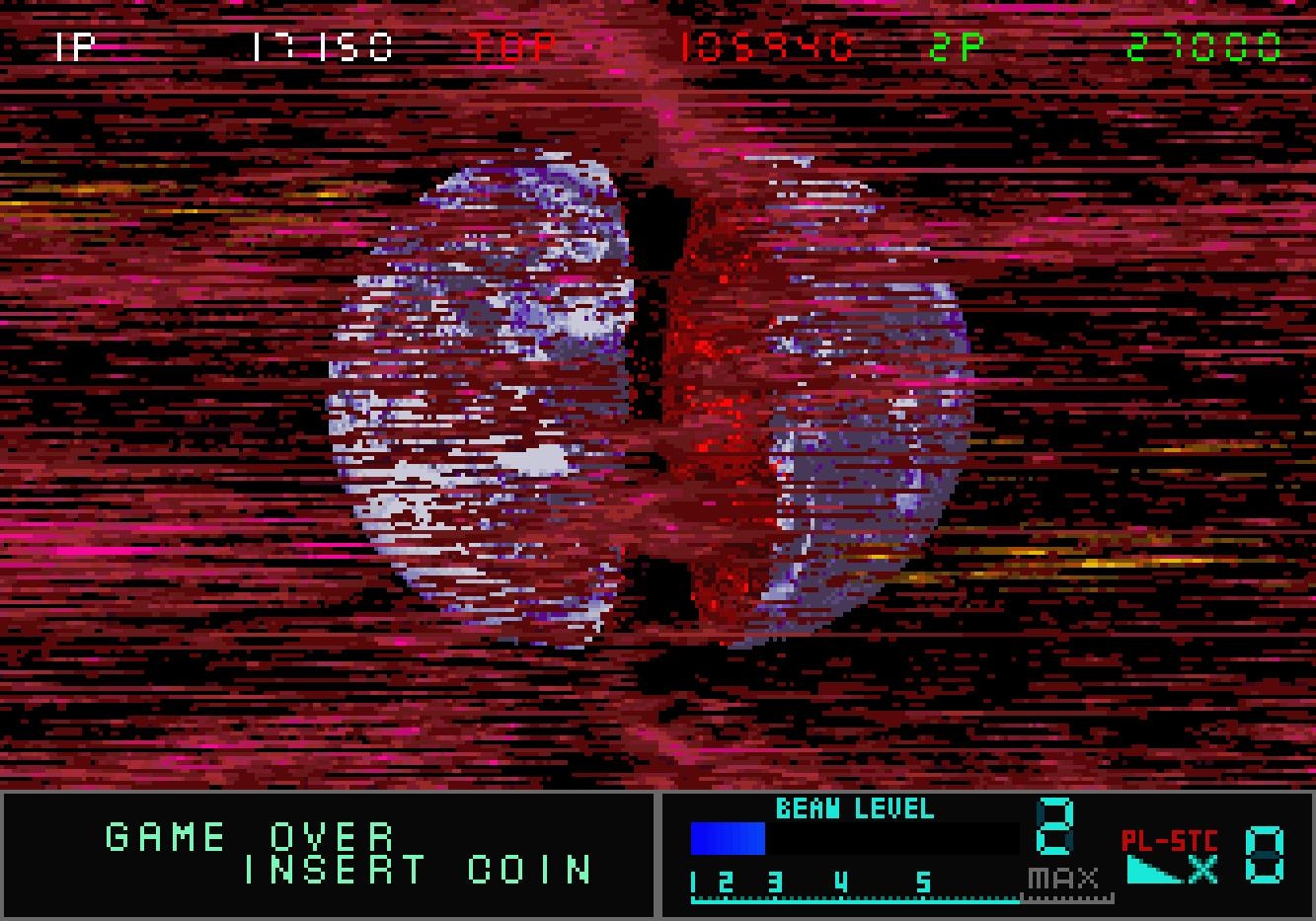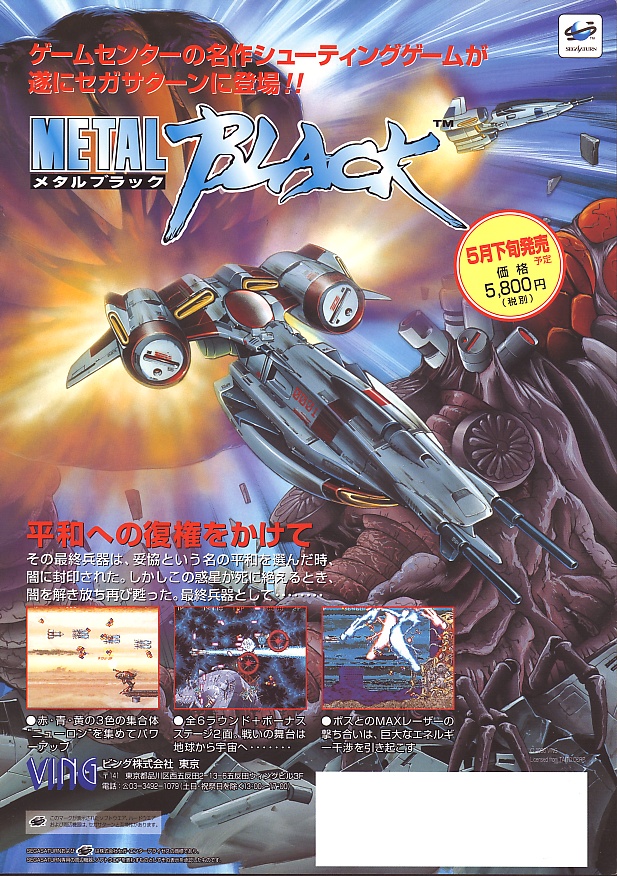Metal Black
From Sega Retro
| Metal Black | |||||||||||||||
|---|---|---|---|---|---|---|---|---|---|---|---|---|---|---|---|
| System(s): Sega Saturn | |||||||||||||||
| Publisher: Ving | |||||||||||||||
| Developer: Ving | |||||||||||||||
| Licensor: Taito | |||||||||||||||
| Original system(s): Taito F2 System | |||||||||||||||
| Sound driver: SCSP/CD-DA (21 tracks) | |||||||||||||||
| Genre: Shooting[1][2] | |||||||||||||||
| Number of players: 1-2 | |||||||||||||||
| |||||||||||||||
|
Metal Black (メタルブラック) is a Sega Saturn horizontal shoot-'em-up developed and published by Ving. It is a port of the 1991 Taito arcade game Metal Black. It was released exclusively in Japan in May 1996, and it later received a Satakore budget label re-release in July 1998.
Contents
Story
In the future, Earth is attacked by aliens that possess the ability to harness the power of "Newalone," a strange, molecule-like structure. Earth counters by building its own fleet also based on Newalone technology, but it freezes the project on favour of peace with the aliens. The contract is very one-sided and Earth is dying. A single solider breaks into a military complex and manages to steal a "Black Fly," a space ship designed to use Newalone.
Gameplay
Metal Black is a side-scrolling shoot-'em-up wherein players pilot a "Black Fly" space fighter in a last-ditch effort to save humanity from hostile alien invaders. It can be played as one player or by two players simultaneously. The second player can enter the game at any point by pressing START on a second control pad. Rather than collecting special weapons or having bombs, the Black Fly has a single weapon that can be powered up by grabbing the Newalone molecules that float throughout the stages. Collecting Newalone molecules gradually increases the ship's beam meter and strengthens its attack. The Black Fly can expend its beam meter to unleash a large beam that obliterates enemies caught within its blast. Bosses have beam weapons as well and compete with the Black Fly to consume Newalone to power their own beams. If the player and the boss fire their beams simultaneously, one overpowers the other depending on which beam has a higher power level, starting a "beam duel."
The Black Fly moves in any direction using the D-Pad. It fires its primary weapon by pressing ![]() or
or ![]() , which can be held for rapid-fire. The strength of the weapon grows with the beam level, which increases as the ship collects Newalone particles. The beam level starts at 0 but can increase to level 5 and then to "max" level.
, which can be held for rapid-fire. The strength of the weapon grows with the beam level, which increases as the ship collects Newalone particles. The beam level starts at 0 but can increase to level 5 and then to "max" level.
If the beam level is at least 2, the Black Fly can unleash its beam weapon by pressing ![]() . The beam covers a large area and can penetrate through multiple enemies and through terrain. The beam meter starts draining once the ship starts firing its beam and stops when the meter is fully drained (consequently reverting the main weapon to its base power). Players can prolong the duration by collecting more Newalone particles. Like the main weapon, the beam is larger and more powerful at higher levels. At max level, the beam spreads into rays of lightning that attack enemies and neutralizes enemy projectiles in all directions, but it can be focused into a beam by holding
. The beam covers a large area and can penetrate through multiple enemies and through terrain. The beam meter starts draining once the ship starts firing its beam and stops when the meter is fully drained (consequently reverting the main weapon to its base power). Players can prolong the duration by collecting more Newalone particles. Like the main weapon, the beam is larger and more powerful at higher levels. At max level, the beam spreads into rays of lightning that attack enemies and neutralizes enemy projectiles in all directions, but it can be focused into a beam by holding ![]() . It also reverts to a beam once the beam meter has drained to level 3.
. It also reverts to a beam once the beam meter has drained to level 3.
The ship is destroyed if it is hit by an enemy or collides with terrain. It revives in place with the same beam level if the player has extra lives remaining. Extends are given at 70,000 points, then every 150,000 points after that. The game ends if the player runs out of lives but can be continued a limited number of times (with the score reset). There are four difficulty levels (Easy, Normal, Hard, and Very Hard), and players can set the starting number of lives (between 1 and 4).
Items
There is only one power-up, which appears plentifully.
| Newalone | |
|---|---|
| Collect to increase the ship's beam meter. |
Rounds
| Down to Earth | |
|---|---|
| Cry for the Moon | |
| Dream Land | |
| Crystal Lize | |
| Nemesis Crisis | |
| A Mirage of Mind: Gaia | |
| An alternative ending can be viewed by dying and not continuing on this stage. |
Bonus stages
After the first and third rounds, players play a bonus stage in which a group of enemies must be destroyed by locking on the moving targets using the D-Pad and launching cluster missiles with ![]() or
or ![]() . There is a time limit of 30 seconds for the first bonus stage and 60 seconds for the second bonus stage. Bonus points are awarded for the number of targets successfully destroyed. Sprite scaling is used to simulate a 3D space.
. There is a time limit of 30 seconds for the first bonus stage and 60 seconds for the second bonus stage. Bonus points are awarded for the number of targets successfully destroyed. Sprite scaling is used to simulate a 3D space.
History
Development
The game is also titled Project Gun Frontier 2 because it was made by many of the staff members as Gun Frontier, though there are no story or gameplay connections to that game. Allegedly, content from a canceled Darius sequel was also reused for this game, supported by the fish and crustacean enemies found in the game. The beam mechanic was also used in G-Darius, which was not released on Sega hardware.
The game was a major inspiration for Border Down; both that game and Metal Black share a composer.
Legacy
In 2023, the Saturn version of the game received a re-release by City Connection called Metal Black S-Tribute for the Xbox One and Steam.[4] It was originally announced for the Nintendo Switch and PlayStation 4 as well,[5] but these releases were canceled as the company Hamster had already re-released the arcade version for these platforms as part of their Arcade Archives series.[6]
Versions
Aside from unavoidable load times introduced by the compact disc format, Metal Black is otherwise a perfect port of the original arcade release.
Production credits
- Producer: Senba Takatsuna, Hori Takamasa
- Game Design: Senba Takatsuna, Hori Takamasa, Kuroki Naoya, Ohno Tomohiro, Seguchi Takashi, Mizobe Kumi, Watanabe Yasuhisa, Sawaki Jun, Katsuhisa Ishikawa
- Thanks: Kimura Chiho, Taniyama Norihito, Miyazawa Takayuki
- Art Director: Senba Takatsuna, Ohno Wepokichi
- Programmer: Tarabar, Kuroki Naoya, Seguchi Takashi
- Hardware Engineer: Sawaki Jun, Takeda Tomio
- Decorator: Mizobe Kumi
- Sound Director: Yack. (Zuntata), Babio Ishikawa (Zuntata)
- Bit Pattern: Moriyama Yoshihiro, Tanaka Kuniaki, Yoshikatsu Nakahara, Tsuneoka Masatoshi, Vap-Awave
- Cast: Ho Lee Chan, Zuntata, John Neianik 6Th, Sakou Menme
- Special Thanks: 3D Master, Mar., Karu, Wiz. Master, Nomura Akio, Mihara Hiromitsu, Tajima Kazunari, Fujita Tsukasa$, Zak Munn, Kouno Yoshiaki, Ogata Masaki, Fujisue Ichirou, Fujiwara Hidehito, Sakou Hiroyuki, Yagi Chan, Yoshida Sayuri, Sekiguchi Satomi, Shirou Imaoka, Yuki Hisao, Shimizu Shigenobu, Ohishi Kenji, Shimizu Fumihiko, Shintaku Satoyuki, Naomitsu Abe, Ishii Hide, Ushiroda Tatsuya, Yasukouchi Daisuke, Kurabayashi Akira, Takaaki Tomita, Nakamura Taicho, Ootsuki Akira, Sugiyama Kazuhiko, Default Members
Magazine articles
- Main article: Metal Black/Magazine articles.
Promotional material
Physical scans
| Sega Retro Average | |||||||||||||||||||||||||||||||||||||||||||||||||||||||||||
|---|---|---|---|---|---|---|---|---|---|---|---|---|---|---|---|---|---|---|---|---|---|---|---|---|---|---|---|---|---|---|---|---|---|---|---|---|---|---|---|---|---|---|---|---|---|---|---|---|---|---|---|---|---|---|---|---|---|---|---|
|
| 61 | |
|---|---|
| Based on 11 reviews | |
| Saturn, JP (Satakore) |
|---|
Technical information
- Main article: Metal Black/Technical information.
References
- ↑ File:MetalBlack Saturn JP Box Back.jpg
- ↑ 2.0 2.1 https://sega.jp/fb/segahard/ss/soft_licensee2.html (Wayback Machine: 2020-03-20 23:05)
- ↑ Sega Saturn Magazine, "1996-05 (1996-03-22)" (JP; 1996-03-08), page 27
- ↑ https://www.segasaturnshiro.com/2023/02/01/metal-black-bust-a-move-collection-s-tribute-release-on-modern-platforms/ (Wayback Machine: 2023-02-01 23:54)
- ↑ https://www.nintendolife.com/news/2023/01/classic-taito-games-get-enhanced-re-releases-on-switch-in-february (Wayback Machine: 2023-01-05 19:25)
- ↑ https://www.gematsu.com/2023/01/metal-black-s-tribute-cancelled-for-ps4-and-switch-priced-to-match-arcade-archives-release (Wayback Machine: 2023-01-25 20:49)
- ↑ File:MetalBlack Saturn JP SSEnding.pdf
- ↑ Famitsu, "1996-05-31" (JP; 1996-05-17), page 1
- ↑ Fun Generation, "08/96" (DE; 1996-07-10), page 79
- ↑ Intelligent Gamer, "August 1996" (US; 1996-0x-xx), page 85
- ↑ Joypad, "Juillet/Août 1996" (FR; 1996-0x-xx), page 72
- ↑ MAN!AC, "09/96" (DE; 1996-08-14), page 48
- ↑ Mega Force, "Été 1996" (FR; 1996-0x-xx), page 79
- ↑ neXt Level, "August 1996" (DE; 1996-07-10), page 64
- ↑ Playmag, "Juillet/Août 1996" (FR; 1996-0x-xx), page 128
- ↑ Saturn Fan, "1996 No. 15" (JP; 1996-07-05), page 81
- ↑ Sega Saturn Magazine, "1996-09 (1996-06-14)" (JP; 1996-05-24), page 231
- ↑ Sega Saturn Magazine, "Readers rating final data" (JP; 2000-03), page 11
| Metal Black | |
|---|---|
|
Main page | Comparisons | Hidden content | Development | Magazine articles | Reception | Technical information | |
